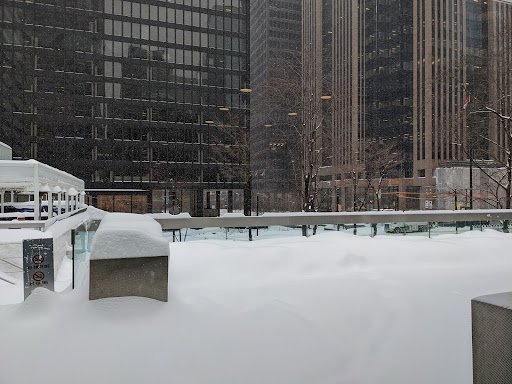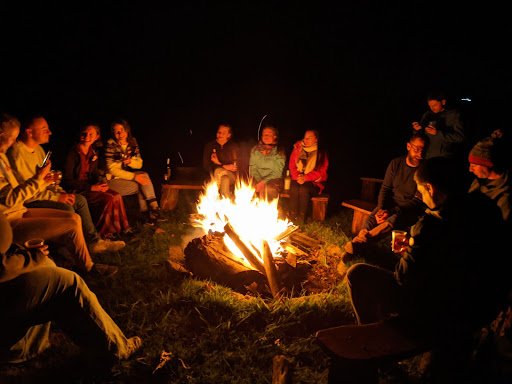Breaking Up with My Corporate 9-5 to Build WorkAnywhereGo, a Community for Aspiring Digital Nomads
Ariel Fu is a corporate-converted digital nomad entrepreneur currently wandering the top nomad hubs in the world. She’s working on building WorkAnywhereGo, a community where aspiring digital nomads can seek targeted resources and advice from a network of established nomads in each specialized field.
Prior to launching her digital nomad life, she worked in product management and project management in the finance industry in Toronto for years. She is passionate about travel, community building, and connecting people with a shared purpose. Follow her journey on Instagram or here.
Ariel at Christ the Redeemer looking over Rio De Janeiro with her newfound freedom. Photo by Ariel Fu.
From Model Minority to 9-5 Rebel
Like many members in the Asian Wander Women community, I used to be a good kid chasing all the mainstream trophies growing up. In fact, I was in that mindset for my first 27 years until I took a step back and reflected on what the most important things to me in life are.
We’ve been told and programmed to work hard to go to a good school, hustle at the internship for that return offer, secure a full-time job with a reputable company, buy a house in a prime location, find a partner with a decent job, get married and start a family. I tried to picture myself checking off all of those by living a corporate 9-5 life, but I wasn’t excited about that kind of future.
We are under the constant stress of achieving those milestones, but in the grand scheme of things, who dictates that we have to follow a certain template to live?
The Corporate Matrix
Backtrack 3 years ago, I was sitting in my cubicle in an office tower in downtown Toronto. Looking out of the window, the sky looked quite looming, and it was only 4:32 pm. I scanned through my to-do list on Outlook, and thought to myself, how do any of these tasks connect to the things I want to do most in life?
Toronto Financial District. Photo by Ariel Fu.
Back in school, we’ve been told by the career office, parents, and society to chase those big-name companies. I have worked for six global companies in total—to be fair, big companies are good launchpads for people in their early careers, but I’ve been in the system long enough to notice a common pattern.
Every role in a big company is designed to be specific with a limited scope. Your outcome is highly dependent on other departments, which limits the impact you can make on the end product, not to mention many of us are actually working on “internal tools.” So we end up spending most of the time navigating the corporate matrix itself and managing the intricate relationships among different departments, and less on the actual products and services. Sometimes moving to a different department inside the organization or switching to another company gives you a new perspective for some time, but the overall corporate dynamic does not change.
Photo by LYCS Architecture on Unsplash.
I felt stuck in a matrix and repeating the same routine in the same city every day. The only thing that I look forward to is that 3 weeks of vacation where I get to see more of the world, and maybe the networking and cultural events outside of work.
At the same time, you may find the social narrative changed, working in corporate is no longer considered “cool” like it used to be when we first graduated, and people started to flock to impact-driven disruptive ventures. If you feel disengaged and unfulfilled, you are not alone.
I don’t want to make an exaggeration to twist the message because the corporate life wasn’t horrible. There are events and activities you can attend in and outside of work, and you get a decent steady income from it. If you find joy in doing it, good for you! But for myself, I need to break out from the matrix for location freedom.
The Most Valuable Asset in Life
Time is the most important asset in our life, because we never know how much runway we have left to be in a healthy state to do the things we want to do most in life. When you realize we only have a finite amount of time in this world, everything else such as climbing the corporate ladder suddenly becomes so insignificant. But hey, if you can’t give yourself more time, why not give your time more life?
I decided that it was not worthwhile selling my time to do the things that I don’t identify the value with just for a paycheck.
Belonging and Community in Big Cities
My feeling about living in a big city like Toronto is complicated. On one hand, it’s the city that enables some success I had in my early career thanks to the kind-hearted people I met along my way, on the other hand, I didn’t find a community to call home in the city. There were moments when I had some short-lived feelings of community, but as people’s life situations changed, the communities also dissolved.
I know it’s corny to cite a pop song, but the lyrics from “This City” by Sam Fisher somehow magically voiced how I felt about living in a big city.
I've been seeing lonely people in crowded rooms
…
This city's gonna love me then leave me alone
This city's got me chasing stars
It's been a couple of months since I felt like I'm home
Am I getting closer to knowing where I belong?
Like many other metropolitans, Toronto was hit hard by covid. Before the pandemic, I would invite friends to explore different events and activities in the city, but after being under the longest lockdown in North America, many of my friends moved out of Toronto. Though the city is recovering from the pandemic, what’s more destructive is the loneliness pandemic.
It’s supposed to be easier to meet people in big cities, but I find a lot of the encounters and relationships tend to be transient and situational in metropolitans. I do have close friends in the city that I can count on to have heart-to-heart conversations with, but I didn’t find a community that shares my passion and is there for my good and bad moments in life.
Unlike in some other “warm-culture” cities where you can easily strike up a conversation to make new friends, it’s not the case in Toronto; you’ll need to go to events and venues with an existing group of friends. I grew up in a culture where inviting as many people as possible to dinner is the norm, but here: personal space is the rule.
On weekdays, people are walled up in their busy metropolitan life. From my experience of living in downtown Toronto for 8 years, it’s an almost implied etiquette to remain silent and a neutral face in the elevators. But on the weekends, you just see people party crazy and post their happy moments with their group on Instagram. Am I the only one who feels this way?
Do others feel the same? I have to find my own community.
Overlooking downtown Toronto from the west end. Photo by Ariel Fu.
Dating in Big Cities
Some say how you perceive the city changes with your relationship status. I do agree with that to some degree, but dating in big cities is a bit like trying to find a soul-striking article in a Playboy magazine.
Unfortunately, we live in an age of finding potential dates by swiping the phone on a toilet seat vs. organically meeting in social situations. The unlimited pipeline of profiles in big cities grew our decision paralysis and low commitment issue, which counters exactly with what love needs to grow deeper.
Even if you have a trusting partner now, you still need to face the proposition of what makes you feel most fulfilled and alive in life.
Can I Afford to Break up with My 9-5?
I found my day was occupied by the full-time job and other daily grinds. After work, I simply did not have the headspace to pick up the research that I had planned to do a while back. When I’m employed by a company, I commit my full-time energy to them.
I know we’ve been told to look for jobs while we have a job, and don’t quit without securing the next one, and I do think it’s a wise strategy in many cases, but for my situation, I don’t want to keep on delaying pursuing my passion. I came to realize that we all have limited energy to spare, if I keep on living in the 9-5 life, I may never get a head start on my passion project. Thanks to my years working in corporate and my academic background in finance, I was able to come up with a detailed financial plan on exactly how long my savings and investments can support me to quit without a job lined up, explore a career sabbatical, and pursue my passion projects.
It definitely could be frightening to let go of that safety net after years of being under its protection, but if your situation allows it, it’s a life-changing experience you will never forget. You might face skepticism from the outside, and even from your family, but as long as you are heading toward the direction of your ultimate goal, then you are one step closer.
Even if your passion project does not work out, the experience you’ll earn, and the digital asset you’ll create, can both serve as a portfolio that will help you with your future endeavors. Worst case, you can always go back and find a job in your previous field, but you’ll come back with a refreshed perspective, so what’s to lose?
Building a Community to Connect Aspiring Nomads with Nomad Experts
In the spring of 2022, I joined the Great Resignation and quit my corporate job, exited the apartment lease, sold my furniture on Facebook Marketplace, and started my open-end nomad journey, with the intent to establish a long-term location-flexible life.
This might sound counter-intuitive, but I travel to find my tribe. I didn’t feel a strong sense of community in Toronto because my YOLO (You Only Live Once) philosophy is different from the traditional view of living. But when I started to explore those online digital nomad communities, somehow I felt home. This group of people shares the same values and mindset as me: love traveling and believe in living life to the fullest. I was also surprised by how people are willing to connect and help each other out without expecting anything in return.
So I decided to visit the top nomad cities in the world to meet other digital nomads in person. So far, I’ve done Buenos Aires, Split, Barcelona, Lisbon, and Medellin. Playa del Carmen, Bali, Chiang Mai, and Madeira are next. I’ve met so many incredible nomadic souls, and they come from all kinds of backgrounds, not just developers and e-Commerce owners, but also digital marketers, entrepreneurs, UI designers, and coaches, many are working on multiple interesting forward-looking projects. Personally, I’ve got a lot of inspiration from them.
Looking back at the time when I was dreaming about having a digital nomad life, I wish I could easily talk to a nomad who can provide me some guidance about how I can work towards location independence based on his/her experience.
There are a lot of communities for digital nomads, but not a lot connecting aspiring nomads with these nomads, and that’s why I’m building the WorkAnywhereGo Community where aspiring digital nomads can filter by field of expertise and nationality to connect with a group of nomads from the WorkAnywhereGo Expert Network.
Travel conversations over a bonfire at an Uruguay farm. Photo by Ariel Fu.
Are Digital Nomads Escaping the “Real Life?”
I deeply understand that living a digital nomad life is a privilege, especially when you recognize that some people’s job functions do not allow them to work remotely, and when you travel to less-developed countries of the world, you realize some countries do not yet have the infrastructure to support a remote job dominant society.
Some might criticize people who left their traditional 9-5 life to travel and are just escaping from their “real” life. To that, I would say, the action of exploring the world does not mean escaping from reality, it’s about creating a new reality and pushing the boundaries of how to live a more fulfilled life. In addition, there are many environmental factors that are out of your control, if you feel you no longer thrive in a certain environment, it’s for your better personal growth to seek a more fitting one.
Getting a Remote Job Is NOT the Only Way to Become a Digital Nomad
Many people think only developers, or people working in tech get to live a digital nomad life, but this is no longer the case. With remote work sweeping the world throughout the pandemic, any job that can be done via a wifi connection can in fact be performed from anywhere in the world. Where you work does not have to be where you live. Though the current complication interfering with tax, employee benefits, and data security makes it difficult for companies to permit employees to work from anywhere.
Fortunately, finding a company that allows you to work remotely is not the only option, there are many other ways to achieve location independence, you can turn yourself into a contractor and continue to work with your current employer which could circumvent the legality of working from abroad. Becoming a freelancer is a great path to achieving long-term location flexibility. Or, you can explore starting an online business where you can establish a system to build passive income streams for the years to come.
Last Words
I’m not one of those influencers who claimed to build multiple 6-figure businesses overnight, I’m just someone who didn’t feel fulfilled in the corporate world and is now navigating the world of location independence. I want to share what I learned, and build a community to help more people leave a life that they don’t enjoy and start pursuing a more fulfilled life. You can learn more and connect further with me here.





